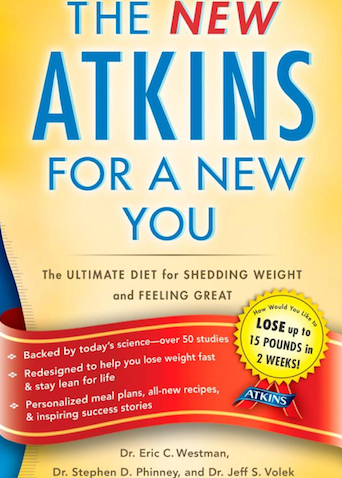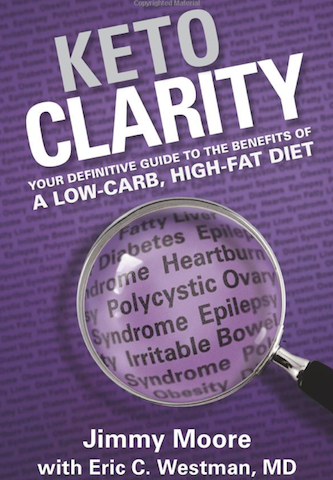“It has been shown fairly conclusively that it is only the high-fat, not the high-protein diet that produces the greatest health benefits in combination with a low carbohydrate intake.”
Moment of Clarity by Dr Ron Rosedale
“Humans went into ketosis every winter for thousands of generations. Being in a low level of ketosis is the more natural state for our metabolism.”
Moment of Clarity by Dr Terry Wahls
In Fat Loss on the Cheap: Part I, we talked about Dr Krista Varady Every-Other-Day Diet as a inexpensive way to loss fat. The book could be summarized as: feast one day, fast the next day, then repeat. (Without the marketing hype, the summary would be: eat normally one day, do a modified 500 calorie fast the next day, then repeat.) If this approach works for you, read no further. But if you don’t loss weight, or your weight loss stalls, or your hungry all the time, please continue reading. You could be carb-intolerant.
“Everyone is different and has different carb-tolerance levels. Some people, especially athletes, can maintain ketosis with as much as 100gm of carbs a day. But most people need to be at 50gm or less, and those with metabolic syndrome typically need to stay below 30gm of total carbs a day to produce adequate ketones.”
Moment of Clarity by Maria Emmerich
A person’s carb-tolerance is primarily influenced by three factors: age, activity level and gender and to a lesser extent endocrine health and medications. So, a twenty-something, active male can safely consume more carbohydrates than a menopausal, sedentary woman. If you are overweight or obese and have metabolic syndrome or type 2 diabetes, you are by definition carb-intolerant. People that are carb-intolerant will benefit from a low-carb or ketogenic diet. The ketogenic diet might cure your other medical problems too.
“Type 2 diabetes is a state of profound carbohydrate intolerance, and carbohydrate restriction reduces the demand on the pancreas to secrete excessive insulin in the face of insulin resistance while improving glycemic control and facilitating weight loss.”
Moment of Clarity by Dr Keith Runyan
Personally, I got interested in ketogenic diets because the diet was a traditional treatment for epilepsy. I used to have epilepsy among other chronic conditions. Doing a low-carb version of the Specific Carbohydrate Diet cured my epilepsy along with asthma, allergies, chronic sinus infections, migraine headaches, yeast infections and osteoarthritis.* Because of my own personal success, I have been following the research and experimenting with low-carb and ketogenic diets for some time.
“The efficacy of ketosis in reducing the frequency of seizures in patients with epilepsy has been in the medical literature since 1928.”
Moment of Clarity by Dr David Purlmetter
The ketogenic diet is being used clinically to treat a number of serious illnesses: epilepsy, type 2 diabetes, obesity, metabolic syndrome, cardiovascular disease, polycystic ovary syndrome (PCOS), irritable bowel syndrome, gastroesophageal reflux disease (GERD) and nonalcoholic fatty liver disease (NAFLD). Research is being done on using the ketogenic diet to treat cancer, Alzheimer’s disease, Parkinson’s disease, multiple?sclerosis (MS), dementia, schizophrenia, bipolar disorder and sleep disorders. If you have any of these serious conditions the ketogenic diet could literally be a life saver.
“A ketogenic diet may provide weight loss benefits over and above those achieved with carbohydrate restriction alone. It provides all the benefits of a low-carb diet but to a somewhat greater degree, since ketosis increases satiety and provides mental clarity, focus, prolonged concentration, and increased energy.”
Moment of Clarity by Dr William Davis
Until recently, it has been very hard to get good information on a whole food, ketogenic diet. Jimmy Moore has just put out a book called Keto Clarity: Your Definitive Guide to the Benefits of a Low-carb, High-fat Diet. Just in case your are wondering if this is just some new fad diet, Jimmy Moore will introduce you to 22 experts on ketogenic diets and their research.
Jimmy Moore states that the biggest mistake people make with ketogenic diets is eating too many carbohydrates. The second biggest mistake is eating too much protein. A ketogenic diet is a very high-fat, low-carb and just-enough-protein diet. The book will explain:
- The science of ketosis and why it has health giving benefits and to test to know you’re in ketosis.
- How to find your personal carb-tolerance and protein-tolerance.
- How to free yourself of the habit and need to eat three or more meals a day and how to manage societal pressures surrounding food.
- Why people on a ketogenic diet need more salt and why consuming more salt isn’t a health problem.
- How to use a ketogenic diet and intermitted fasting for fast, hunger-free weight loss.

This book is a detailed look at ketogenic diets. Section 3 has information suitable for a medical professional. Dr Volek explains the “natriuresis of fasting” and why ketogenic dieters need more salt. Just take a pass on the bouillon cubes and make some bone broth.
If you are looking for a more how to approach to low-carb eating, The New Atkins for a New You is an excellent whole food primer. This book will introduce you to your “metabolic bully” and help you get this bully out of your life. It’s safer to just pass on the industrial vegetable oils and artificial sweeteners suggested in the book. Small amounts of honey or stevia would be a better choice than artificial sweeteners. After a few months of low-carb eating, your sense of what is sweet will naturally be dialed down to a healthier level. I would also suggest avoiding the Atkins brand of prepared foods and find ways to prepare these foods at home. Also, take a pass on the commercial bouillon cubes and industrial thickeners and make some bone broth and Onion Gravy. This is especially important for followers of the Specific Carbohydrate Diet or GAPS which must avoid common food additives.

This book is an excellent “how to” approach to low-carb eating. Just ditch the industrial vegetable oils, artificial sweeteners, bouillon cubes and the Atkins brand of prepared foods. Other then that, it’s a great book.
One thing I have learned about low-carb and ketogenic diets over the years, is that it’s easy to eat your fill of salad or greens and still be low-carb or even ketogenic. For example, you could consume 12 cups of romaine lettuce a day and still be under 20gm of total carbohydrate. Or you could eat 4 cups of cauliflower and be under 20gm of total carbohydrate. That’s a lot of salad or greens. The trick is to save all your carbohydrates for salad and greens and not to waste them on starchy vegetables, fruit or simple sugars.
Fiber is also very important because many people find low-carb or ketogenic diets constipating. When you cut out the grains, legumes, beans, starchy vegetables and fruit there’s not much fiber left in the diet. Consuming large amounts of salad and greens will help fill you up and supply essential vitamins, minerals and phytochemicals.
Salad and greens also provides fiber. Fiber comes in two forms: insoluble and soluble. Insoluble fiber just passes through the body. Soluble fiber can be consumed by our gut flora. The gut flora thrives on the carbohydrates in the fiber.** The gut flora also produces short and medium chain fatty acids from the fiber but cannot consume these fatty acids in the anaerobic environment of the bowel. These fatty acids are reabsorbed in the large intestine and used by our body. These special fatty acids are being researched for their health promoting qualities. The fantastic part of this process is that eating soluble fiber from greens is like eating high-fat, after digestion… And you get these very special fatty acids produced just for you by your gut flora!
So, eat your salad and greens.?Know that your friendly gut flora with convert these carbohydrates into health promoting fatty acids… after digestion!
“Herbivores obtain little glucose from diet, but up to 70% of their energy needs from short-chain fats produced by bacterial fermentation. These short-chain fats are transformed in the liver to ketones which nourish neurons, substantially reducing the body’s glucose needs.”
Perfect Health Diet by Paul Jaminet

Contrary to popular belief, it is possible to be ketogenic and eat your fill of salad or greens. This meal is ketogenic. It’s very high-fat, low-carb, and just-enough-protein. The trick is to save your carbohydrates for a plate full of salad and greens and take a pass on the starchy vegetables, fruit, or simple sugars. Just remember to enjoy your salt and bone broth!
If you would like to learn more about the science of ketogenic diets please see this lecture by Dr Peter Attia. He sees being overweight or obese not a disease state but a marker for an underlying medical condition, a predisposition to insulin resistance. Dr Attia shows how the ketogenic diet will help improve bio-markers, body composition and athletic performance. He will explain why a ketogenic diet will make you more “metabolically flexible” as a fat burner. He also talks about new treatment protocols using ketone supplements such as medium chain triglycerides (MCT) that may be especially effective for treating neurological disorders.
*Please note: I was on a very low-carb, not a ketogenic diet when I cured my epilepsy. I was on a very low-carbohydrate diet (40-60gm) but I didn’t have a way to test if I was actually in ketosis.
**If you are wondering why you should care about the health of your gut flora, please see: What is a Healthy gut?
Updated March 13, 2015: Here’s another example of an extreme athletic event using a ketogenic diet. Sami Inkinen and Meredith Loring rowed 2800 miles from Monterey, California, to Honolulu, Hawaii in 45 days. The couple became the fastest pair to accomplish this crossing. They completed this row on a whole food, very high fat diet. Dr Stephen Phinney the author of The New Atkins for a New You was the pair?s nutritional adviser. The couple did the row to raise funds for childhood diabetes and publicize the dangers of eating sugar.
Updated April 2, 2015: If the idea of not eating fills you with anxiety, Dr Mercola has a technique you can learn that will help with anxiety: How to Radically Increase Your Intermittent Fasting Success.

